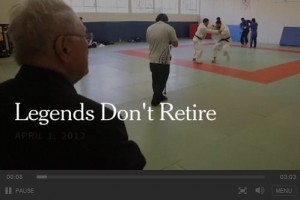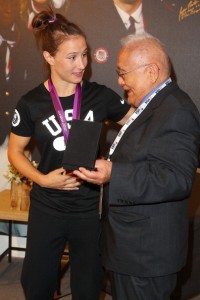Sports of The Times: For 66 Years, a Force for Judo in the United States
Published by the New York Times April 1, 2012.

Kevin Johnson, a junior in the SJSU Department of Journalism and Mass Communications, helped shoot and edit this three-minute New York Times clip on Coach Uchida.
By WILLIAM C. RHODEN
Yoshihiro Uchida celebrated his 92nd birthday on Sunday.
Even more impressive is that for 66 of his years, Uchida has been coaching judo at San Jose State University. He built the program into a national power and has almost single-handedly elevated the stature and visibility of judo in the United States.
Uchida, a Japanese-American, has also been a model of determination and has had a knack for transforming obstacles into opportunity and using an opponent’s momentum to his advantage.
Last month Uchida watched proudly as San Jose State hosted the national collegiate judo championships and his Spartans won their 45th championship in 51 years. This summer, one of his athletes, Marti Malloy, will represent the United States at the Olympics in London.
As important as judo has been to Uchida, his life has been framed by other events. While he served in the United States Army during World War II, his family was sent to American internment camps. Because of his heritage, he struggled to find work after the war, but he eventually founded successful businesses. And he has never quit working or coaching.
“I thought that when I got to be 65, I’d start getting Medicaid, Medicare and all that,” he said during a recent interview in his office. “I thought, Well, that would be the end. But when I got to be 65, I felt great. I feel that if I just retire and do nothing, my whole life would start to shrink.”
Uchida was born April 1, 1920, in Calexico, Calif., the third of five children. He grew up in Garden Grove, helping grow strawberries and tomatoes. At 10 he learned judo, part of a traditional method for Japanese parents in America to instill their culture in young men.
In 1940, Uchida enrolled at San Jose State, where he studied chemical engineering and was student-coach of the physical education department’s judo program. After the attack on Pearl Harbor, he was drafted into the Army, where he served in the medical corps as a laboratory technician.
For a generation of Japanese-Americans, the American dream disintegrated on Feb. 19, 1942. President Franklin D. Roosevelt signed Executive Order 9066, which led to the removal of about 110,000 Japanese and Japanese-Americans from the West Coast during the war. Uchida’s parents were incarcerated at a camp in Arizona; his brothers were sent to the Tule Lake Relocation Center in Northern California; his sister and her husband were sent to an internment camp in Idaho.
Reminders of that have never left. In fact, the building on campus that now houses the judo dojo — renamed Yoshihiro Uchida Hall in 1997 — was a processing center for internment camps.
“It was upsetting and confusing,” Uchida said. “You’re an American citizen, drafted into the Army. You’re in basic training, and your parents are in an internment camp. You really did get angry.”
Like African-American soldiers serving during World War II, American-born Japanese who were United States citizens — Nisei — served in segregated units where they were subjected to much of the same racist treatment.
Uchida recalled an episode in 1942 at Camp Crowder in Missouri when a burly white soldier confronted a group of Nisei and referred to them as Japs. Uchida, who stood 5 feet 5 inches, took offense and challenged the soldier. A scuffle ensued, and Uchida took down the stunned soldier with a judo throw. “I was a hero in the barracks,” he said.
After four years of service, Uchida returned to San Jose State and earned a degree in biological science. He also resumed teaching and taught judo to police candidates.
Most of the candidates were World War II veterans attending college under the G.I. Bill of Rights. Many had taken a mongrelized form of self-defense in the service. “They had no interest in a Japanese-American teaching them anything,” Uchida said. “They were big and arrogant.”
On the first day of class, one student, a veteran and a San Jose State football player, confronted Uchida. “He asked me what I thought I could teach him and said that he used people like me for bayonet practice,” Uchida said. “He said, ‘What would you do if I did this?’ ”
The veteran picked Uchida up, dangled him and swung him around. “The class thought it was funny,” Uchida said. “I just dumped him, in front of the whole class; the class was just shocked. I turned around and said, ‘O.K. fellas, this is judo.’ There wasn’t trouble after that.”
After graduating in 1947, Uchida remained the San Jose State coach, a part-time position. However, he had difficulty finding employment in a hospital despite his degree and his extensive experience as a lab technician in the Army. One prospective employer, Uchida said, told him, “You might be able to do the work, but we’re not hiring any Japs.”
Uchida protested that he had worked with thousands of veterans during the war. “I was told: ‘That was because you were in the military. Here, we have all these civilians, and you would be touching them — and they wouldn’t want that.’ I was real discouraged.”
Fortunately, a friend who was a supervisor for the county had a friend at O’Connor Hospital and arranged for Uchida to be hired as a lab technician in the emergency room, where he worked the overnight shift. Uchida eventually became a lab supervisor at San Jose Hospital.
His passion remained judo, and his crusade was to help establish it as a sport sanctioned by the Amateur Athletic Union, which, with the help and influence of Henry Stone, the judo and wrestling coach at California, came about in 1953.
That year, San Jose State sponsored the first nationwide A.A.U. championships. In 1962, Uchida organized the first national collegiate judo championships, which San Jose State won. (Judo is still not sanctioned by the N.C.A.A.) He and Stone helped judo become an Olympic event, and Uchida was the coach of the United States’ first Olympic judo team, which competed at the 1964 Summer Games in Tokyo and won a bronze medal.
As a Japanese-American, “to be elevated to coach an American Olympic team was something you never dreamed of,” Uchida said.
“This for me was one of the greatest things,” he added. “Nobody had ever heard of such a thing.”
Judo was not enough to sustain Uchida and his young family, however. Unable to get a home loan because of insufficient income, Uchida, who was still teaching judo, went into business on his own. He bought a failing medical laboratory from an acquaintance in 1957 for $3,000, putting $75 down and paying the balance in increments. Using friendships and connections with doctors he had worked with, Uchida turned the business into a profitable venture. Part of the profits kept San Jose State judo afloat.
During the next three decades, Uchida bought 40 laboratories. In 1989, he sold his business to Unilab for $30 million. He and 78 investors later began the San Jose Nihonmachi Corporation. They built a sprawling $80 million complex of housing and commercial units in San Jose’s Japantown, converting an eyesore into an impressive community.
After more than nine decades of living, Uchida said, chief among the many lessons he has learned is that if you have a cause or a mission, determination alone is not sufficient to see it through.
Uchida uses the internment camps as an example of what can happen to the uninvolved. He recalled how Japanese-Americans were scapegoated and stereotyped and became the target of unfounded suspicions.
“People would come up with all kinds of accusations and things that were not true,” he said. “But we were not politically involved enough to be able to stop that. You have to be politically involved and know what’s going on. If you’re not politically involved, things happen and there’s nothing you can do about it.”
Uchida added: “Sometimes, you get kicked around. But if you believe in it, just keep pushing ahead. You might have to find out how to get there by going backward and then coming back again.
“But if you don’t get involved,” he said, “you won’t live long.”

